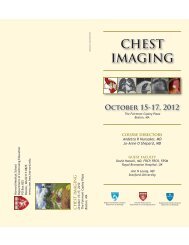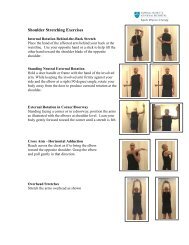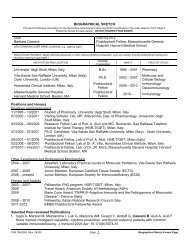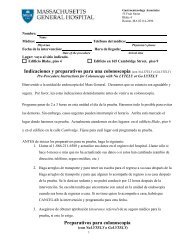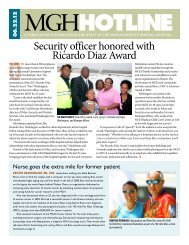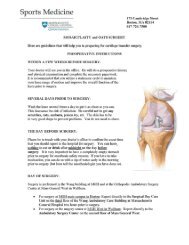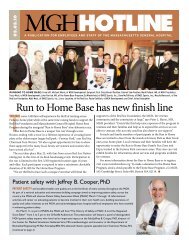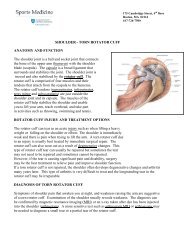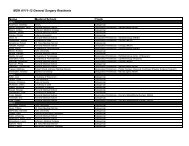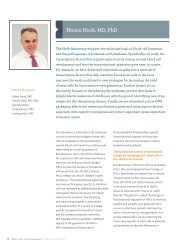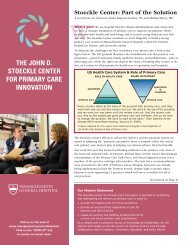Cyril Benes, PhD
Cyril Benes, PhD
Cyril Benes, PhD
Create successful ePaper yourself
Turn your PDF publications into a flip-book with our unique Google optimized e-Paper software.
6<br />
...<br />
<strong>Benes</strong> Laboratory<br />
<strong>Cyril</strong> <strong>Benes</strong>, <strong>PhD</strong><br />
Jessica Boisvert<br />
Li Chen, <strong>PhD</strong><br />
John Clark<br />
Adam Crystal, MD, <strong>PhD</strong><br />
Anahita Dastur, <strong>PhD</strong><br />
Regina Egan<br />
Patricia Greninger<br />
Randy Milano<br />
Xeni Mitropoulos<br />
Helen Thi<br />
Kristina Williams<br />
MGH Center For Cancer Research ANNUAL REPORT 2012<br />
<strong>Cyril</strong> <strong>Benes</strong>, <strong>PhD</strong><br />
The <strong>Benes</strong> laboratory, known as The Center for Molecular Therapeutics, is<br />
engaged in the design and application of personalized therapies for cancer.<br />
Targeted cancer treatments have emerged from research studies showing<br />
that the biology of cancer cells differs from that of healthy cells, and that<br />
each person’s cancer has a unique genetic signature. Our goal is to pinpoint<br />
the cancer cells’ biological weak points and then to attack those weak points<br />
with smart drugs that are specifically designed for such an attack. Using a<br />
large collection of human cancer cell lines, we have made major advances<br />
in identifying molecular genetic features, or biomarkers, of a tumor that<br />
predict responsiveness to targeted therapies. We are focused on developing<br />
molecular diagnostics that will reveal the best treatment course for each<br />
patient and on discovering how gene mutations in cancer can be exploited<br />
to develop new treatments.<br />
We are studying the molecular basis of<br />
response to anticancer agents.<br />
Genetics of Cancer Therapeutic<br />
Response<br />
Clinical responses to anticancer therapeutics<br />
are often restricted to a subset of cases<br />
treated. In some instances, clear evidence is<br />
available that correlates clinical responses<br />
with specific tumor genotypes. Our goal is<br />
to identify tumor cell states (i.e., genotypes,<br />
gene expression) that predict sensitivity to<br />
anticancer agents. To accomplish this goal,<br />
we use high-throughput screening and expose<br />
1,000 cell lines derived from a broad spectrum<br />
of cancers to known and potential anticancer<br />
therapeutic agents. For each compound, we<br />
characterize the variation in response across<br />
the cell line collection and correlate response<br />
to genomic and transcriptomic information,<br />
including cancer gene mutations, genome-<br />
wide copy number information, and mRNA<br />
expression data. We then work to translate<br />
these findings to clinical use by analyzing<br />
clinical specimens to possibly inform the<br />
design of clinical studies.<br />
The use of a very large cell line collection<br />
allows us to capture some mutational<br />
events that—although relatively rare—are<br />
very important for therapeutic response.<br />
In addition, while some patient selection<br />
strategies have proven quite successful, a wide<br />
range of variation in response to treatment<br />
exists in almost all cases. Similar to this<br />
clinical observation—and perhaps related<br />
mechanistically—our large cell line collection<br />
allows us to observe important variation<br />
in drug response within a given sensitizing<br />
genotype. For example, among BRAF-mutant<br />
cell lines which are, as a group, remarkably<br />
sensitive to BRAF inhibitors, some lines do<br />
not respond significantly. Based on these<br />
observations, we aim to identify additional<br />
biomarkers that will permit more accurate<br />
prediction of drug response in the clinic.
Network representation of genomic correlates shared by MEK1/2 and RAF inhibitors indentified by<br />
linear regression using drug sensitivity data across hundreds of cancer cell lines.<br />
Resistance to Cancer Therapies<br />
Even for the most successful anticancer<br />
therapies, drug resistance invariably emerges<br />
and limits the impact on patient lives. The<br />
molecular mechanisms underlying acquired<br />
resistance to cancer therapeutics are not well<br />
defined but are likely to be different for each<br />
therapy and cancer. We are investigating how<br />
drug combinations could overcome resistance,<br />
and within this context, studying how changes<br />
in intracellular signaling pathways affect drug<br />
response.<br />
We are tackling the problem of therapeutic<br />
resistance using cell lines made resistant in the<br />
laboratory or isolated from resistant tumors.<br />
Previous results have shown that these cell line<br />
models do recapitulate at least some of the<br />
mechanisms of resistance at play in patients.<br />
We interrogate combinations of a panel of<br />
clinically relevant anticancer drugs as a way to<br />
quickly identify candidate therapeutic strategies<br />
and to jumpstart mechanistic studies that<br />
will help characterize the molecular basis of<br />
acquired resistance.<br />
We are also approaching the problem<br />
of resistance using a very different and<br />
complementary approach. We systematically<br />
identify genes that can cause resistance<br />
to a given drug in a given context using a<br />
transposon-based genetic screen. Transposons<br />
are mobile genetic elements that can insert<br />
into a host genome—in our case, the genome<br />
of cancer cells. We use an engineered version<br />
of a transposon so we can control its mobility<br />
and identify genes with expressions that are<br />
modified by its insertion, leading to drug<br />
resistance.<br />
Selected Publications:<br />
Garnett MJ, Edelman EJ, Heidorn<br />
SJ, Greenman CD, Dastur A, Lau<br />
KW, Greninger P, Thompson IR, Luo<br />
X, Soares J, Liu Q, Iorio F, Milano<br />
RJ, Bignell GR, Tam AT, Davies H,<br />
Stevenson JA, Barthorpe S, Lutz SR,<br />
McLaren-Douglas A, Mitropoulos<br />
X, Mironenko T, Thi H, Richardson L,<br />
Zhou W, Jewitt F, Zhang T, O’Brien<br />
P, Price S, Hur W, Yang W, Deng X,<br />
Butler A, Choi HG, Chang JW, Baselga<br />
J, Stamenkovic I, Engelman JA,<br />
Sharma SV, Saez-Rodriguez J, Gray<br />
NS, Settleman J, Futreal PA, Haber<br />
DA, Stratton MR, Ramaswamy S,<br />
McDermott U, <strong>Benes</strong> CH. Systematic<br />
identification of drug sensitivity<br />
genomic markers in cancer cells.<br />
Nature. 483(7391):507-5, 2012, Mar 28.<br />
Singh A, Sweeney MF, Yu M, Burger<br />
A, Greninger P, <strong>Benes</strong> C, Haber<br />
D, Settleman J. TAK1 (MAP3K7)<br />
inhibition promotes apoptosis in<br />
KRAS-dependent colon cancers.<br />
Cell. 148(4):639-50, 2012 Feb 17.<br />
<strong>Benes</strong> CH, Poulogiannis G, Cantley<br />
LC, Soltoff SP. The SRC-associated<br />
protein CUB Domain-Containing<br />
Protein-1 regulates adhesion and<br />
motility. Oncogene. 2011 Jul 4.<br />
Katayama R, Khan TM, <strong>Benes</strong> C,<br />
Lifshits E, Ebi H, Rivera VM,<br />
Shakespeare WC, Iafrate AJ,<br />
Engelman JA, Shaw AT. Therapeutic<br />
strategies to overcome crizotinib<br />
resistance in non-small cell lung<br />
cancers harboring the fusion<br />
oncogene EML4-ALK. Proc Natl<br />
Acad Sci U S A. 108(18):7535-40,<br />
2011 May 3.<br />
Yuan TL, Choi HS, Matsui A, <strong>Benes</strong> C,<br />
Lifshits E, Luo J, Frangioni JV, Cantley<br />
LC. Class 1A PI3K regulates vessel<br />
integrity during development and tumorigenesis.<br />
Proc Natl Acad Sci U S A.<br />
105(28):9739-44, 2008 Jul 15.<br />
<strong>Benes</strong> CH, Wu N, Elia AE, Dharia T,<br />
Cantley LC, Soltoff SP. The C2 domain<br />
of PKCdelta is a phosphotyrosine<br />
binding domain. Cell. 121(2):271-80,<br />
2005 Apr 22.<br />
Principal Investigators<br />
7



